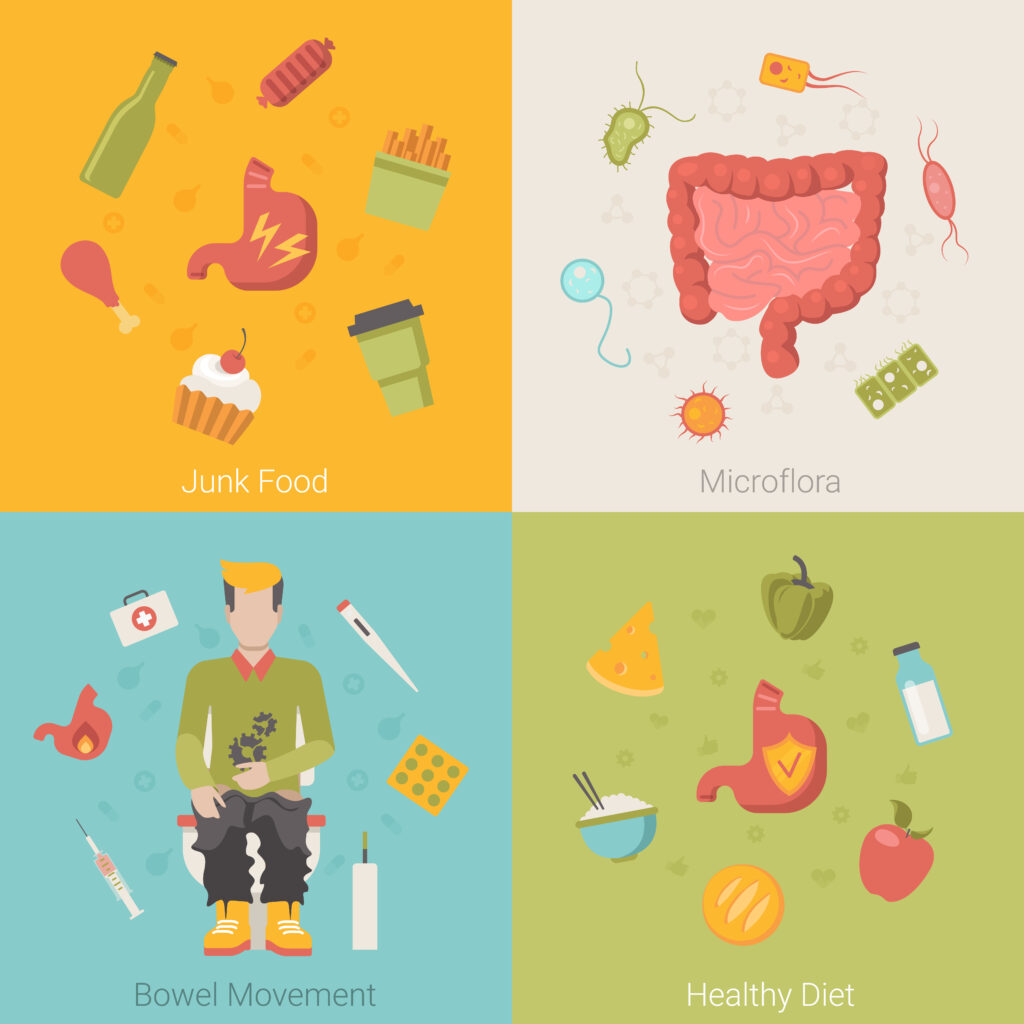Here we are going to share information on the topic, “Which food items should be avoided in the gut.” General well-being depends on having a healthy gut. Your gut improves immunity, controls digestion, and even has an impact on mental health. Taking care of your digestive system is essential as a result. A list of items to avoid for a healthy stomach is provided below. Being conscious of what you eat is one way to do that.
While some meals can be somewhat detrimental to gut health, others can be really beneficial. You may greatly enhance your digestive system’s health and get its benefits by choosing foods that are good for it.

Which food items should be avoided in gut
What Is Good Gut Health, and Why Is It Vital?
To have a healthy gut, the population of bacteria in your digestive tract, often known as your gut microbiome, needs to be in balance. The correct digestion, vitamin absorption, and general health of the gut are all facilitated by a healthy gut microbiota. Stronger immunity, better mental health, and a lower chance of developing chronic illnesses are all advantages of having a healthy gut.
What occurs if a healthy gut isn’t supported by your diet?
Consuming foods that disrupt your gut microbiota can cause inflammation, imbalances, and a higher chance of digestive diseases like IBS. Type 2 diabetes and heart disease, as well as weight gain, can be attributed to a diet heavy in processed foods, sugar, and unhealthy fats.
The Top 10 Foods to Steer Clear of for Gut Health
Maintaining intestinal health requires sensible food selection. In order to greatly enhance your digestive health, we’ve put up a list of the top ten items that you should stay away from.
1. Prepared meals
The gut microbiome can be harmed by processed foods since they are heavy in harmful fats, preservatives, and additives.
2. Sugar that has been refined
The equilibrium of bacteria in your stomach can be upset by refined sugar, which can cause inflammation and digestive problems.
3. Gluten
Gluten is a protein that can irritate the gastrointestinal tract in those who have non-celiac gluten sensitivity or celiac disease. It is present in wheat, barley, and rye.
4. Products made from dairy
Dairy products can trigger digestive problems including gas, bloating, and diarrhoea in a lot of people.
5. Fried dishes
Fried meals contain a lot of bad fats, which can damage your gut flora and cause inflammation.
6. Flesh from red meat
Eating red meat on a regular basis raises the risk of colon cancer and can cause inflammation.
7. Synthetic sugar substitutes
Artificial sweeteners have the potential to upset your gut’s bacterial balance and aggravate digestive problems.
8. Tobacco
Drinking too much alcohol can damage your gut microbiota, which can cause immune system decline and digestive problems.
9. Coffee
While a reasonable amount of caffeine is usually harmless, too much of it can lead to stomach problems including acid reflux and heartburn.
10. Corn syrup with high fructose
High-fructose corn syrup is a highly processed sugar that can cause inflammation and upset your gut’s bacterial balance.
Foods to Eat to Maintain Gut Health
The foods on the above list should be avoided in order to maintain intestinal health. However, what ought to you eat in its place? These are some dietary choices that support intestinal health.
- Foods high in fibre. Whole grains, fruits, and vegetables are examples of foods high in fibre that can support the health of the gut microbiota.
- Foods that have been fermented. Yogurt, kefir, and kimchi are examples of fermented foods that contain good bacteria that can support a balanced gut microbiota.
- Probiotics. Probiotics are good bacteria that can assist enhance digestive health and balance your gut microbiota.
- Good fats. Nuts, avocados, and olive oil are among the foods high in good fats that can support gut health.

Which food items should be avoided in gut
The Top 6 Foods to Support Gut Health
1. Primarily Plants
Although we’re not big on miraculous diets, there is one easy step you can take to significantly improve the health of your gut: Consume a diverse diet that is primarily plant-based (preferably organic). A varied, plant-based diet that provides you with the spectrum of fibre and nutrients your gut bacteria require to flourish is the well-known, simple-to-follow Mediterranean Diet.
Three cups of mixed veggies and two cups of fruit should be consumed daily (for a person who eats 2,000 calories a day).
2. Foods High in Fiber
The main benefit of fibre, commonly known as “roughage,” is that it keeps you, well, regular. It lowers cholesterol levels and aids in satiating your hunger for longer. Additionally, it’s a fantastic source of energy for your gut microbes, especially prebiotics, a kind of fibre that is mainly indigestible by humans. Your probiotics, or beneficial bacteria, need to eat, and these little pieces of indigestible fibre are one of their favourite foods.
Beneficial sources include beans and lentils, whole grains, artichokes, bananas, asparagus, oats (particularly good), garlic, leeks, and wheat bran. They also include numerous forms of fibre and prebiotics.
3. Omega-3 Fatty Acids in Seafood
There is a connection between increased gut microbial diversity and omega-3 fatty acids. They may also offer a number of other health advantages, including as lowering inflammation, lessening depressive symptoms, and enhancing heart health. Fatty fish and some shellfish are the foods highest in omega-3s (shrimp lack omega-3s).
How much to eat: For those 18 years of age and older, the National Institutes of Health suggests 1.1 to 1.6 grammes per day. Wild salmon, mackerel, sardines, mussels, and anchovies are good sources.
4. Foods with fermentation
The beneficial bacteria in your gut microbiome are called probiotics. Probiotics can also be consumed as “live active cultures,” which are found in naturally fermented foods like kefir, kombucha, and yoghurt. Eating these foods improves our general health by raising the concentration of probiotics in the gut flora. Eat foods that are naturally fermented instead of those that are quickly pickled and have vinegar added for a sour taste.
How much to eat: Since everyone’s levels of probiotics vary, there are no general guidelines for daily consumption. Good sources include fish sauce, kefir, kombucha, tempeh, yoghurt, miso, sauerkraut, and kimchi.
5. Polyphenol-Rich Foods
Large chemicals called polyphenols help shield plants from illness. They travel to the large intestine, where they are broken down into smaller, health-promoting molecules, because they are too massive to be absorbed in the small intestine. It appears that consuming polyphenols improves the makeup of gut microorganisms by suppressing pathogens and promoting the growth of beneficial bacteria.
There are no suggestions yet on how much to eat. berries (blueberries, blackberries, lingonberries, and sea buckthorn), almonds, coffee, tea, black beans, red grapes, red wine, apples, dark chocolate, and turmeric are good sources.
6. Foods High in Vitamin D
The “sunshine vitamin,” vitamin D, supports our immune and neurological systems as well as improving bone health. Additionally, it promotes the growth of beneficial intestinal flora. The majority of Americans don’t receive enough of this important vitamin.
The recommended daily intake is 15 micrograms (mcg) for those between the ages of 19 and 70, and 20 mcg for those over 70.
Salmon, trout, sardines, eggs, milk enriched with vitamin D, and mushrooms are good sources (portabella, white, crimini, maitake)
Frequently asked questions (Which food items should be avoided in gut)
1. Which foods are detrimental to the gut?
Ans: Worst Foods for Digestive System
Foods that are fried. 1/10. Citrus Fruits: They can cause diarrhoea and are heavy in fat. 2/10. They can upset some people’s stomachs because they are acidic and heavy in fibre. Artificial Sweetener. 3…. Excessive Fiber. Beans: 4/10. Cabbage and Its Cousins: A 5-star rating. 6. Fructose. 7/10…. Hot Cuisine. 8/10.
2. Which three meals harm the gut?
Ans: These three foods should be avoided as they may increase your risk of heart disease and diabetes. They are not very gut-friendly.
Diet Coke. According to some researchers, artificial sweeteners in zero-calorie drinks may interfere with your microorganisms…. Red Meat. An unhealthy stomach can have detrimental effects on the heart as well.
3. Which veggie is bad for the stomach?
Ans: Foods high in fructooligosaccharides (FODMAPS), such as broccoli, onions, garlic, sprouts, and cauliflower, should be avoided by people who experience digestive problems regularly.
4. Which three meals harm the gut?
Ans: These three foods should be avoided as they may increase your risk of heart disease and diabetes. They are not very gut-friendly.
Diet Coke. According to some researchers, artificial sweeteners in zero-calorie drinks may interfere with your microorganisms…. Red Meat. An unhealthy stomach can have detrimental effects on the heart as well.
5. Which foods are beneficial to the gut?
Ans: Gut Health Yoghurt: 15 Foods That Promote Good Gut Health. Probiotics, sometimes referred to as “friendly bacteria,” are abundant in live yoghurt. … Almonds… Olive oil… Kefir… Miso… Sauerkraut… Kimchi… Sourdough…
6. What eliminates microorganisms in the gut?
Ans: Here are 8 unexpected items that can damage your gut flora without further ado.
Not Consuming a Wide Variety of Foods.
Inadequate Prebiotic Intake; Excessive Alcohol Consumption; Usage of Antibiotics; Insufficient Frequent Exercise; Cigarette Smoking.
Insufficient Sleep… Excessive Stress.
7. Is berries unhealthy for the stomach?
Ans: Brinjal aids in restoring the compromised digestive system and preserving a healthy Agni (digestive fire). However, because of its Ushna (hot) and Guru (heavy) properties, consuming too much brinjal might result in bloating or acid reflux.
Govern Your Digestive Health
It’s critical to keep in mind that every person has a different gut health, so what may be helpful for one person may not be for another. It is important to consult a healthcare provider, such as a gastroenterologist or nutritionist, if you are having digestive problems or have questions about the health of your gastrointestinal tract. These professionals can assist you in creating a customised strategy for preserving gut health and taking care of any problems that may be hurting you.
Conclusion (Which food items should be avoided in gut)
In summary, in order to keep our guts healthy, we need to be very aware of the foods we eat. Making the appropriate meal choices is essential for maintaining gut health and general wellbeing. We may create a healthy environment in our digestive systems and encourage optimal functioning by making attentive eating choices.
Let’s stress again how crucial it is to choose the right foods for our gut health. It is imperative that we steer clear of specific foods in order to keep our gut healthy and in balance. It’s critical to stay away from processed foods, high-sugar snacks, and artificial additives. We may actively support gut health by emphasising a diet high in fibre, probiotics, and nutrient-dense foods.
In conclusion, never underestimate the importance of selecting gut-friendly foods. Our dietary choices have a profound effect on our digestive systems, which affects our general health. Making wise decisions and abstaining from harmful foods on a regular basis gives us the ability to nurture a strong and healthy gut.

